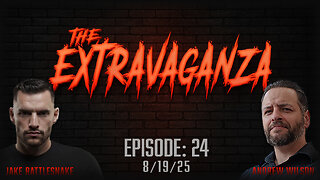Premium Only Content

Sunday, February 14, 2021 - Luke 6:1-16 - Freedom Community Church - Pastor Rob Lloyd
Sunday, February 14, 2021 - Luke 6:1-16 - Freedom Community Church - Pastor Rob Lloyd - Battle Ground, Washington, US
Sunday Service Time: 10 AM
Sunday Service Location: 1919 SW 25th Ave, Battle Ground, WA 98604
Phone: (360) 975-9356
Email: info@freedomcommunity.church
Prayer Request: wepray@freedomcommunity.church
Mailing Address: 1400 NE 136th Ave Ste 201, Vancouver, WA 98684
Sermon Notes:
Luke 6:1-16
Last week I told you we were going to come back to the instruction from Jesus on how we are to treat those we might have viewed as traitors, betrayers, or enemies. Well, we’re going to get a reprieve for another week as the pieces here today are just so wonderful, I didn’t want to try and push through.
• So, as we jump in today, we’re going to see two incidents that deal with the Sabbath (meaning to cease from activity, or to rest). Now just to be clear about the Christian and the Sabbath, Col. 2:16-17 says “let no one judge you in food or in drink, or regarding a festival or a new moon or sabbaths, which are a shadow of things to come, but the substance is of Christ. Meaning Jesus came to give us true rest from our striving.
• That’s why Rom. 14:5 (speaking of the Sabbath) tells us “One person esteems one day above another; another esteems every day alike. Let each be fully convinced in his own mind.” So, the Sabbath of the law is not required for the follower of Jesus.
• But the principles of the Sabbath, which Jesus fulfilled, are extremely relevant and important to us.
6:1 Now it happened on the second Sabbath after the first (Luke 4:31) that He went through the grainfields. And His disciples plucked the heads of grain and ate them, rubbing them in their hands. 2 And some of the Pharisees said to them, “Why are you doing what is not lawful to do on the Sabbath?”
I picture the disciples just walking, talking and enjoying life with Jesus as they walk along the road, and personally I feel we get a glimpse of heaven here, until the legalist Pharisees come along to try and steal the joy of the Lord for a shot at self-righteous condemnation.
• And looking at their accusations we see its not what they were doing that was the problem for these religious leaders (because Deut. 23:25 made provision for eating grain by the handfuls when traveling), but when they were doing it. For they took Gods blessing of rest and added 613 laws of burden to it.
• Laws such as not being able to travel more than 1,999 paces from your home on the Sabbath, you couldn’t sow more than one stitch or write more than one letter, or switch on a light…
• And among those laws the Pharisees decided rubbing the grain together in their hands on the Sabbath was threshing (not to mention three other laws they were apparently breaking). Which in effect undid what God intended to be a blessing.
But before we go on to see how Jesus responds, we should notice the freedom the disciples felt when they were with Jesus. All the do’s and don’ts of the religious leaders that they grew up under seem to have just vanished when they were walking with Jesus.
• And that’s how it is today for those who truly know what its like to walk with Him.
• What a shame it is when we 1) either choose to go a different direction than He’s going sometimes, or even more so, 2) for those who never walk with Him.
• He wants to give such rest and liberty (Gal. 5:1) to all who will walk closely with Him.
So now Jesus responds.
3 But Jesus answering them said, “Have you not even read this, what David did when he was hungry, he and those who were with him: 4 how he went into the house of God, took and ate the showbread, and also gave some to those with him, which is not lawful for any but the priests to eat?” 5 And He said to them, “The Son of Man is also Lord of the Sabbath.”
The incident Jesus brought up is in 1 Sam. 21. And unlike their questioning why Jesus disciples were breaking their law, this incident really was a violation of the law. Now a lawyer would try to make sure something like this never came up, but Jesus, knowing the Law and knowing the intent of it, dove straight in.
• The Law says these twelve loaves of bread (one for each tribe) were only to be eaten by the priests and replaced once a week (Lev. 24:5-9). But when David and his men were starving, they went into the tabernacle (which was in Nob at this time) and the priest gave them the bread to eat.
• So, Jesus brings up this passage which these religious leaders never knew what to do with (because King David is a national hero to this day) and shows them the priest at that time understood what they did not.
• To get this we could use some more information Matthew provides of this account, where in addition to calling them out for not knowing the scripture when they claimed to be the experts of it (something He’s going to do on 4 other occasions [Matt. 19:4, 21:6, 21:42, 22:3]), He says “If you had known what this means, ‘I desire mercy and not sacrifice,’ you would not have condemned the guiltless” (Matt. 12:7, Hos. 6:6).
You see, they made the Sabbath a burden, while Jesus intended it to be a blessing. They made the Sabbath work while claiming what they were doing was abstaining from work (for every law they created they then had to figure out how to get around themselves). Jesus intended for it to be a day of rest.
• Mark’s gospel makes this point in adding to this very account that Jesus said “The Sabbath was made for man, and not man for the Sabbath (Mark 2:27).
• And knowing they would ask, “by whose authority do you make these claims”, He beat them to the punch and said, “The Son of Man is also Lord of the Sabbath.”
• Folks, make no mistake about this, with these words Jesus was declaring Himself to be God. And in essence was saying, “I know what I made the Sabbath for and its not what you have done with it”.
Now we come to our second Sabbath account.
6 Now it happened on another Sabbath, also, that He entered the synagogue and taught. And a man was there whose right hand was withered. 7 So the scribes and Pharisees watched Him closely, whether He would heal on the Sabbath, that they might find an accusation against Him.
So now these religious leaders are beginning to figure out just how compassionate Jesus is, and you would think this would begin to win them over, but the opposite is true.
• I can almost picture them finding this man and asking him to come to synagogue with them so they could set Jesus up for this moment.
• Their hearts had become so hard they were more interested in discrediting Jesus than they were in caring for the very people they were to be leading into a closer relationship with God.
8 But He knew their thoughts (5:22), and said to the man who had the withered hand, “Arise and stand here.” And he arose and stood. 9 Then Jesus said to them, “I will ask you one thing: Is it lawful on the Sabbath to do good or to do evil, to save life or to destroy?” 10 And when He had looked around at them all, He said to the man, “Stretch out your hand.” And he did so, and his hand was restored as whole as the other. 11 But they were filled with rage, and discussed with one another what they might do to Jesus.
How often have people turned the blessing of God into curses? They sure did. Jesus even pointed out that it was evil (wrong) for them to ignore meeting a serious need, when it was in their power to meet it, especially on the Sabbath.
• But a few more of the Pharisees laws again point out how far they were from His heart, for if a building collapsed on the Sabbath, they said you could move just enough rubble to release someone who was still alive, but couldn’t retrieve the dead until after the Sabbath. And if the person you saved had a dislocated ankle, you couldn’t set it until after the Sabbath.
• And if that wasn’t enough proof, after Jesus shows the heart they should have had for this man (by healing him on the spot) but didn’t, they start plotting His destruction. Which was His very question to them, for 1) this was the Sabbath and 2) they were literally planning His destruction (verse 9, Mark 3:6)!
What marvelous passages these are for in them the Lord explains His heart for His creation.
• I’m so grateful for these verses because it again tells us our Lord isn’t about keeping us under some oppressive rule, but rather about liberating us from bondage as we follow Him.
• And in these passages, He instructs us in how we are to respond when there is a legitimate need and we have the capability to meet it.
• I say legitimate because the enemy would love to throw stuff at us non-stop to keep us from gathering to worship. And truly, most things can wait without detriment to those the Lord has placed before you. But when it cannot, do not.
Folks, our God loves to set people free, and He’s been demonstrating His love for us from the beginning.
• The question is are we trying to hem Him in while He’s trying to liberate us, or are we letting the Lord of the Sabbath give us rest,
• that we might demonstrate even a portion of the care towards others He’s displayed to us, so they might know Him too.
-----------------Mid week message this Thursday------------------
12 Now it came to pass in those days that He went out to the mountain to pray, and continued all night in prayer to God. 13 And when it was day, He called His disciples to Himself; and from them He chose twelve whom He also named apostles:
Jesus (who is God Himself) spent all night with the father before separating the twelve out as those who would be the Apostles of the church. And it appears Jesus already knew (at least in His spirit) who some or all would be (just as we can know in our spirit the answers to some things almost intuitively).
• Yet Jesus didn’t finalize these decisions before going to be with the Father, as He waited upon Him. And this wasn’t some twenty-minute deal but rather an all-night engagement.
• And again, sometimes God gives us some answers before we can almost even finish answering the question, while other times His desire we wait upon Him. And when we won’t make time to wait it out, we miss out.
• When we don’t take the time, He still loves us the same, but we miss out on what we need to know, and likely on our ability to bless others with what He wanted to provide us.
Can you imagine what it would have been like if Jesus had done this like we sometimes (maybe often times) do, and simply gave The Father 20 minutes and went ahead and chose the twelve?
• What if He then got 50% wrong? Thank goodness we don’t know.
• But I bet we can think of times when we’ve done that and the results that didn’t have to turn out the way they did. It doesn’t have to be this way. We can simply make time to wait.
14 Simon, whom He also named Peter, and Andrew his brother; James and John; Philip and Bartholomew; 15Matthew and Thomas; James the son of Alphaeus, and Simon called the Zealot: 16 Judas the son of James, and Judas Iscariot who also became a traitor.
Casting Crowns wrote a song titled “Only Jesus” and the lyrics say “I don’t want to leave a legacy, I don’t care if they remember me, only Jesus. And I’ve only got one life to live. I’ll let every second point to Him. Only Jesus- Jesus is the only name to remember”. What a great reminder and message!
• If you wonder why I bring this up here, then without looking at your bibles or the verses on the screen, recite the names of the 12 Apostles listed here.
• Let’s say you got all twelve, what can you tell me about Alphaeus? Tell me your favorite memory of Bartholomew from the Bible.
• You see, some of the Apostles we hear quite a bit about while others sit in obscurity. And I would say to you the ones we hear much about, after having seen the resurrected Jesus, wouldn’t care if you knew their names at all. I would dare say they would hope the only name we really keep on our minds in our hearts is only Jesus.
Now, Rev. 21:14 speaks of the New Jerusalem in the eternal heavens and tells us “Now the wall of the city had twelve foundations, and on them were the names of the twelve apostles of the Lamb.” So, we see their names and their faithfulness matters to God. He’s the One who chose to put their names there and not themselves.
• So, in keeping with what they learned and handed down to us, that’s what we should desire also.
• But one name among them will not be there and that’s Judas Iscariot. Which leaves us with two possible questions; 1) why did God choose someone He knew would betray Him and turn completely away, and 2) whose name is on that pillar or pillars (if each of their names is written on each pillar and not on each)?
Dealing with Judas, it is first true that God is not restrained by time as we are. He is in all places at all times, meaning He knows what our future is before we arrive in it. And with that in mind, He knew what Judas would do. So why did He choose such a man as this?
• Remember, Jesus came into the world to offer Himself as a living sacrifice with the full intension of dying for us and being raised again on the third day. So, He used what was already in Judas’ heart, by allowing Judas to be close enough to Him that Judas could turn Him over at the appointed time.
• Now to be clear, Jesus didn’t set Judas up or coerce him into betraying Jesus.
• He simply allowed Judas to do what was already in His heart, knowing one way or the other the result would have been the same for Judas, because even after walking side by side in the flesh with God, Judas desired money more than Him. If that experience didn’t change him, nothing would.
And when it comes to who took Judas’ place on the foundations in heaven, we have two choices; 1) Matthias, as listed in Acts 1, or 2) the Apostle Paul. The answer is no one knows for sure.
• What I can tell you is its Matthias, being he was legitimately chosen that day in Acts 1, then you can also bet God has a plan of equal prominence for Paul. It’s just who our God is.
• Folks, increasingly this world dislikes the followers of Jesus more and more. And the more you conduct yourself as a follower of His, the more they will dislike you. Even when your heart is to do good towards them.
• But our God knows how to minister to His followers. And He loves to reward us, when our motivation isn’t about the reward but about offering our love and honor to Him.
-
 LIVE
LIVE
SynthTrax & DJ Cheezus Livestreams
6 hours agoShell Shock Live - The Scorched Earth Remake/Upgrade - 4pm PST / 7pm EST - RUMBLE GAMING
132 watching -
 LIVE
LIVE
Illyes Jr Gaming
2 hours agoBack to Black .....Ops 6 w/ ILLYESJRGAMING
51 watching -
 1:07:59
1:07:59
BonginoReport
5 hours agoBoston Mayor Defies Trump, Protects Illegals - Nightly Scroll w/ Hayley Caronia (Ep.115)
98.4K59 -
 40:45
40:45
Donald Trump Jr.
6 hours agoPeace by Peace: Solving One Problem After Another | Triggered Ep.268
52.1K50 -
 LIVE
LIVE
FrizzleMcDizzle
2 hours ago $0.43 earnedRemnant 2 - Dark Souls-like Shooter?!
116 watching -
 LIVE
LIVE
FoeDubb
1 hour ago🏰KINGDOM MENU: 🏈FOOSBALL & 🎮DELTA FORCE PEW PEWS DILLY DILLY!!
28 watching -
 11:43:31
11:43:31
GritsGG
13 hours agoWin Streaking! Most Wins 3390+ 🧠
60.9K -
 1:08:29
1:08:29
TheCrucible
5 hours agoThe Extravaganza! Ep. 24 (8/19/25)
79.3K18 -
 4:22:25
4:22:25
sophiesnazz
6 hours ago $0.83 earnedLETS TALK ABOUT BO7 !socials !specs
19.1K -
 1:27:30
1:27:30
Redacted News
6 hours ago"There will be consequences!!!" Trump issues big threat to Putin ahead of peace summit | Redacted
104K165